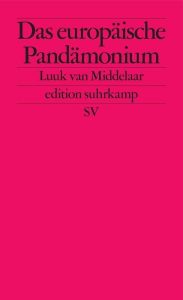Das europäische Pandämonium
 Keine Solidarität, geschlossene Schlagbäume statt offener Grenzen. Als die Corona-Pandemie Europa erreichte, waren sich die Beobachter bald einig: Brüssel hat versagt, im Angesicht der Gefahr ist die EU »zu Roststaub zerfallen« (Der Spiegel).
Keine Solidarität, geschlossene Schlagbäume statt offener Grenzen. Als die Corona-Pandemie Europa erreichte, waren sich die Beobachter bald einig: Brüssel hat versagt, im Angesicht der Gefahr ist die EU »zu Roststaub zerfallen« (Der Spiegel).
Die Rhetorik des bevorstehenden Untergangs begleitet die Union freilich seit mindestens einem Jahrzehnt – und erwies sich doch stets als stark übertrieben. Der Eindruck der Dauerkrise, so Luuk van Middelaar, verdankt sich einer Metamorphose von der Regel- zur Ereignispolitik: Statt stiller Technokratie ist Improvisationsfähigkeit gefragt.
Da Corona die Körper alle Bürgerinnen und Bürger bedroht, wird Europa zu einer öffentlichen Angelegenheit. Und die EU realisiert, dass sie sich zwischen China und den USA selbstbewusst positionieren muss.
Autor
Luuk van Middelaar, geboren 1973 in Eindhoven, ist Historiker und politischer Philosoph. Er lehrt EU-Recht an der Universität Leiden und schreibt als Kolumnist für die Tageszeitung NRC Handelsblad. Für Vom Kontinent zur Union. Gegenwart und Geschichte des vereinten Europa erhielt er 2012 den Preis des Europäischen Buches.
Das europäische Pandämonium
Autor: Luuk van Middelaar
202 Seiten, TB.
Suhrkamp
Euro 16,00 (D)
Euro 16,50 (A)
sFr 23,50 (UVP)
ISBN 978-3-518-12763-6



